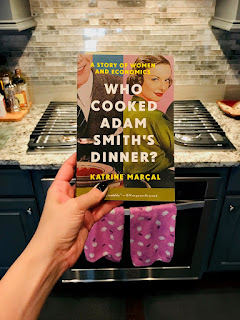Wow! October was a weird one. I had a huge stack of books I planned to read but I ended up only reading 4...okay 3 and a half.
The Readalongs: Rachael (@anovelfamily on Instagram) and I hosted 2 readalongs: Dracula at the beginning of the month and The Historian for the 2nd half. Thank goodness we were partnered on this because I was traveling to visit family during the beginning of the month and I was having a hard time getting my reading time in for Dracula. Then when I got home I got a cold that threw me even more off schedule. I kept at it as long as I could and made it about 1/2 way through but then I gave up. I wasn't loving it (even though I read it years ago and thought I did). She definitely carried the weight with the discussions on that one! Thanks Rachael! When we got rolling with The Historian (which I've also read before and KNEW I loved) she found that she didn't like it. It made for a perfect tradeoff. I liked talking to other readers during the readalongs and I learned a lot that I will take into account when I host my next readalong. Mainly, more planning ahead and reading ahead!
The other 2 books I read were Who Cooked Adam Smith's Dinner by Katrine Marçal (which I have already reviewed) and Once Upon a River by Diane Setterfield (which I will be reviewing in the next few days).
Now I'm off to put together my November reading list. What was your favorite read last month? What are you most excited to read in November.
 A Place for Us by Fatima Farheen Mirza
A Place for Us by Fatima Farheen Mirza Mr & Mrs American Pie by Juliet McDaniel
Mr & Mrs American Pie by Juliet McDaniel The Clockmaker's Daughter by Kate Morton
The Clockmaker's Daughter by Kate Morton Vox by Christina Dalcher
Vox by Christina Dalcher  An American Marriage by Tayari Jones
An American Marriage by Tayari Jones The Banker's Wife by Cristina Alger
The Banker's Wife by Cristina Alger The Beekeeper : Rescuing the Stolen Women of Iraq by Dunya Mikhail
The Beekeeper : Rescuing the Stolen Women of Iraq by Dunya Mikhail  Baby Teeth by Zoje Stage
Baby Teeth by Zoje Stage The Girl on the Velvet Swing by Simon Baatz
The Girl on the Velvet Swing by Simon Baatz Once Upon a River by Diane Setterfield
Once Upon a River by Diane Setterfield 













